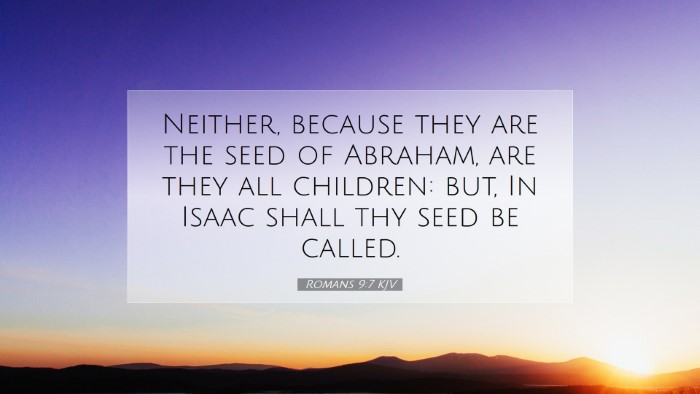Commentary on Romans 9:7
Romans 9:7 states: "Neither, because they are the seed of Abraham, are they all children: but, In Isaac shall thy seed be called." This verse is pivotal in understanding the condition of the covenant and the definition of true descendants of Abraham. Below is a summary of insights from various public domain commentaries.
Contextual Background
The Apostle Paul here addresses the issue of Israel's election and the nature of God's promises. He emphasizes that mere physical descent from Abraham is not what determines one's status as a child of God. Instead, it is the promised covenant that comes through Isaac.
Matthew Henry's Insights
Matthew Henry elaborates on the idea that not all descendants of Abraham are his children in the spiritual sense. He notes:
- Spiritual vs. Physical Descent: Henry points out that physical lineage does not guarantee spiritual inheritance. True children are those who partake in the covenant promise, as illustrated by God’s choice of Isaac over Ishmael.
- The Nature of God's Choice: He emphasizes that God's choice is rooted in His sovereign will and purpose. God chooses Isaac to show that His promise and grace cannot be claimed merely through bloodline.
- Broader Implications: The implications of this verse extend beyond Israel; it signifies that the promise of God is true for all who believe, irrespective of their ethnic backgrounds. This theme resonates throughout Paul's epistle.
Albert Barnes' Commentary
Albert Barnes also provides a significant understanding of Romans 9:7. He highlights several key points:
- Identity of Children: Barnes emphasizes that the statement “In Isaac shall thy seed be called” refers to the line through which God's promises to Abraham specifically are fulfilled. This denotes that spiritual children are those who embody faith, not just those who share a common ancestry.
- Historical Context: He further explains the historical context, asserting that Ishmael was indeed Abraham's son but was not the child of promise. This distinction is crucial for understanding how God’s covenant works.
- Divine Sovereignty: Barnes brings attention to the action of God in election, indicating that it is initiated by God’s sovereign grace rather than human choice or effort.
Insights from Adam Clarke
Adam Clarke offers a detailed exploration of this verse, emphasizing several theological truths:
- Covenantal Promise: Clarke notes that the promise made to Isaac aligns with God’s decree of election. It is a divine selection and is representative of the faith community, indicative of God's eternal purpose.
- Theological Implications: He further discusses how this distinction asserts that Jews, though they are Abraham's descendants, do not automatically inherit God's promises. Instead, it’s through faith in Jesus Christ that one becomes a child of God.
- Invitation to Gentiles: Clarke highlights how this sets the stage for including Gentiles in the body of Christ, affirming the universal nature of God's grace and invitation to salvation.
Theological Reflections
When reflecting on Romans 9:7, several theological themes emerge:
- Election and Grace: God’s election is not based on ethnicity or human effort but entirely on His grace and purpose. This sets a precedent for understanding salvation and grace in a broader, more inclusive context.
- Identity in Christ: Believers today are encouraged that their identity as children of God does not rely on physical lineage but on their connection to Christ through faith. This opens the door for all to partake in God’s promises irrespective of their backgrounds.
- Importance of Faith: The principle that true lineage comes from faith rather than lineage encourages a deeper exploration of what it means to be a child of God. It invokes a call to embody the faith exemplified by Isaac and the patriarchs.
Conclusion
In conclusion, Romans 9:7 serves as a vital reminder to both the original audience and contemporary readers that the markers of God's covenant are grounded in His sovereign will and the faith exercised by individuals. The commentaries from Matthew Henry, Albert Barnes, and Adam Clarke collectively highlight that being a child of God transcends physical lineage and is rooted in the divine promises fulfilled through Jesus Christ.


